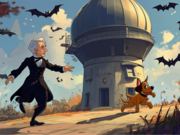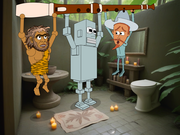奓
奓 character breakdown
many; much / too many; in excess / (after a numeral) ... odd / how (to what extent) (Taiwan pr. [duo2]) / (bound form) multi-; poly-
多
=
夕
:
Mnemonic symbol: Immanuel "Many" Kant.
Many (多) and Doggy Dog (du) have great fun chasing a bat (夕) in front of the observatory (o1). After a while there are two bats (多), and it's not so easy to chase them any more. Suddenly there are more and more (多) bats! Now Many and Doggy Dog experience what it is like to be chased for a change.
Many (多) and Doggy Dog (du) have great fun chasing a bat (夕) in front of the observatory (o1). After a while there are two bats (多), and it's not so easy to chase them any more. Suddenly there are more and more (多) bats! Now Many and Doggy Dog experience what it is like to be chased for a change.
big; large; great / older (than another person) / eldest (as in 大姐[da4 jie3]) / greatly; freely; fully / (dialect) father / (dialect) uncle (father's brother)
Characters with 奓 as component
奓
is not used as a component in another character.
Words with 奓
奓
is not used as a component in another word.
Sentences with 奓
奓 currently does not appear in any sentence.


